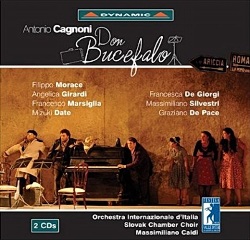Antonio Cagnoni - Don Bucefalo (2009)
Antonio Cagnoni - Don Bucefalo (2009)

Disc 1 01. "Or che il sole usc col giorno (1. Akt)" 02. "Ah! Colui che mi dice" 03. "Oh! Come questo core" 04. "Ma si ragazze mie" 05. "Io dir" 06. "Ma dite: voi con Rosa" 07. "Fra gli scogli e la procella" 08. "Qui congregati e inosservati (2. Akt)" 09. "Ingrata fantasia! Tu m'abbandoni!" 10. "Chi mi ha tolto" 11. "# permesso?" 12. "Ai riguardi io d un addio" 13. "Ah traditor!" Disc 2 01. "No, non serve altro (3. Akt)" 02. "Ma vedi se davvero" 03. "Non fuggirmi, mio ben" 04. "Servo di lor, signori professori" 05. "Trai, trai, trai" 06. "Grazie, grazie, miei cari" 07. "O colli nativi!" 08. "Signor vincemmo!" 09. "Son rimasta" 10. "Dunque ingrata!" 11. "D'ineffabile contento" Il Conte di Belprato - Aldo Caputo
Don Bucefalo - Filippo Morace
Gianetta - Francesca De Giorgi
Carlino - Massimiliano Silvestri
Don Marco - Graziano De Pace
Rosa - Angelica Girardi
Agata - Mizuki Date
Orchestra Internazionale d'Italia
Coro Slovacco di Bratislava
Massimiliano Caldi – conductor
A 19-year-old Antonio Cagnoni (1828–1896) wrote Don Bucefalo as his graduation piece for the Milan Conservatory. It was actually his third opera, at a time when the leading Italian institutions of musical scholarship focused their energies upon training composers of vocal music. Don Bucefalo was such a success in 1847 that the astute Giovanni Ricordi, founder of the Ricordi music-publishing empire, immediately bought up the rights, and the work triumphed throughout the Italian states.
The libretto by Calisto Bassi was based on Giuseppe Palmoba’s Le cantatrice villane , set very successfully by Valentino Fioravanti and premiered in 1799. There are two plots, skillfully entwined. The Goldoni-like first of these involves the expected farcical complications of a beautiful young woman, two suitors, and a jealous husband in disguise and home from the wars. What gives the work its distinctive character is the second plot, about a chorus master who has suddenly appeared in the town, where he assures all the local peasants that their voices are magnificent if untrained, and that like all great singers, they could make huge fortunes if they only received the proper schooling.
Stylistically, the piece owes most to Donizetti, though there are also moments such as the act II finale that recall Rossini; and an act I cavatina for Rosa (“Innocente, sincero è l’affetto”) is clearly beholden to Bellini. The score reinvigorates the cliché about “bubbling over with good humor,” perhaps its finest moment being a lengthy monologue for Don Bucefalo (“Ingrata fantasia!”) that shows him trying to write the verses and music of a dramatic aria. We hear the various naive, primitive effects he achieves as he builds his melody and adds instrumental colors one by one—until the results are a dead ringer for the distinctive style of early Verdi. Audiences in that opera-mad nation where Verdi’s star was in the ascendant must have caught it at once and howled with laughter, but there’s a great deal of enjoyment to be had from the skillfulness of the work’s many ensembles as well. The title role became a favorite of various basso buffos over the years, until styles changed and Don Bucefalo faded away with the new century. ---Barry Brenesal , arkivmusic.com
download: uploaded anonfiles mega 4shared mixturecloud yandex mediafire ziddu
Last Updated (Friday, 27 September 2013 20:28)








